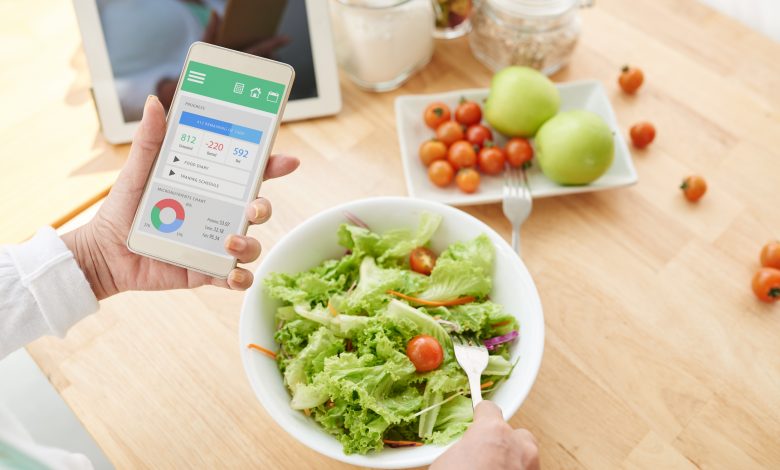
14 tips to avoid obesity and continue a healthy diet in Ramadan
14 نصيحة لتجنب السمنة ومواصلة حمية صحية في رمضان
In the holy month of Ramadan, many people ask the question of “How to maintain a balanced diet and avoid weight gain?” especially since staying at home and lack of movement in the time of Coronavirus triggers your appetite for more items during the night hours, and many fasting people fear the risk of gaining weight in the holy month, which leads them to seek appropriate medical advice that can meet their wishes.
According to Anadolia News Agency, Turkish doctor Rami Ayoub Oğlu offers 14 medical advices to help avoid gaining weight and continue dieting properly during Ramadan, with Oğlu saying that “a complete diet change during Ramadan can slow down metabolism and accelerate weight gain”.
“iftar tables rich in fried foods, pastries, desserts and fatty meat dishes can cause health problems and make weight control difficult,” he said, and to avoid that follow these tips:
1- Having two more meals between iftar and suhoor, because the lack of time between iftar and suhoor during Ramadan reduces the diet of 3 main meals to only 2.
2. A sudden change in nutrition and slowing metabolism with prolonged hunger make it difficult to control weight, and iftar rich in fried pastries, sweets and greasy main dishes can cause problems such as constipation, so adjusting the order of meals in Ramadan is one of the most important points for a healthy diet.
3- Reducing the quantities in meals and adding two light meals every hour and a half after iftar helps to increase the metabolic rate.
4- Do not go to the main course directly, suddenly filling the stomach after all-day hunger can cause problems such as blood pressure, stomach tension and high blood sugar, and it is more appropriate to break fast with two cups of water before going to the main meal.
5- Eat one dish of low-calorie soup and wait 15-20 minutes, because the brain gives the signal of satiety after this period.
6. The main meal should start after this time because with the effect of prolonged hunger, eating quickly and without chewing increases the amount of food consumed and calories consumed, causing weight gain and unwanted digestive problems.
7- Choose non-fried meat, starting with animal protein such as meat, non-fried chicken and fish after soup increases the feeling of satiety.
8. Replacing foods such as rice, pasta and white bread with whole rye bread or whole wheat bread does not increase blood sugar very quickly, daily fiber needs are met and these measures provide weight control, and also prevent constipation complaints.
9- Don’t miss out on dried legumes from the iftar table, for example dried beans, lentils and chickpeas, are sources of plant protein that meet the required fiber needs.
10. The satiety increases with vegetable dishes and salads made from fresh vegetables, they should be on iftar tables because blood sugar will not rise very quickly.
11. It is preferable to eat fruit and nuts on snacks after an hour and a half of iftar, such oilseeds as hazelnuts, walnuts and almonds with fruits. In addition, snacks containing yogurt or (dairy) accelerate metabolism and meet the growing need for vitamins and minerals.
12. Fasting without having suhoor causes rapid hunger during the day and excessive fatigue, protein sources of eggs, cheese and yogurt should be included in the suhoor meal to stay full for a longer period of time..
13. Make linden (plant) tea instead of regular tea on suhoor, and herbal tea such as rosehip or linden should be preferred instead of regular tea and coffee.
14. Fluid intake should be increased between iftar and suhoor and meals by consuming water in small and frequent quantities.
في شهر رمضان المبارك يتبادر إلى أذهان كثيرين سؤال مفاده “كيف نحافظ على نظام غذائي متوازن ونتجنب زيادة الوزن؟” ولاسيما أن البقاء في البيت وقلة الحركة في زمن “كورونا” قد يفتحان الشهية لتناول المزيد من الأصناف خلال ساعات الليل، كما يخشى كثير من الصائمين مخاطر اكتساب الوزن في الشهر الفضيل وهو ما يؤدي بهم إلى البحث عن نصائح طبية مناسبة يمكن أن تلبي رغباتهم.
ووفقا لوكالة الأناضول للأنباء فإن الطبيب التركي رامي أيوب أوغلو يقدم 14 نصيحة طبية تساعد في تجنب اكتساب الوزن، ومواصلة الحمية الغذائية بالطريقة المناسبة خلال رمضان، حيث يقول أوغلو “يمكن أن يؤدي تغيير النظام الغذائي بالكامل خلال شهر رمضان إلى إبطاء عملية التمثيل الغذائي وتسريع زيادة الوزن”.
وأضاف أوغلو:” موائد الإفطار الغنية بالمقليات والمعجنات والحلويات وأطباق اللحوم الدهنية قد تسبب مشاكل صحية وتجعل التحكم في الوزن أمرا صعبا”، ولتجنب ذلك إليك النصائح التالية:
1- تناول وجبتين إضافيتين بين الإفطار والسحور، لأن ضيق الوقت بين الإفطار والسحور خلال شهر رمضان يقلل من النظام الغذائي المكون من 3 وجبات رئيسية إلى 2 فقط.
2- يؤدي التغيير المفاجئ في التغذية وتباطؤ عملية الأيض مع الجوع لفترات طويلة إلى صعوبة التحكم في الوزن، والإفطار الغني بالمعجنات المقلية والحلويات والأطباق الرئيسية الثقيلة، يمكن أن يسبب مشاكل مثل الإمساك، لهذا يعد تعديل ترتيب الوجبات في رمضان من أهم النقاط لاتباع نظام غذائي صحي.
3- تقليل الكميات في الوجبات وإضافة وجبتين خفيفتين في كل ساعة ونصف بعد الإفطار يساعد على زيادة معدل الأيض.
4- لا تذهب إلى الطبق الرئيسي مباشرة فامتلاء المعدة فجأة بعد الجوع الذي يستمر طوال اليوم يمكن أن يسبب مشاكل في ضغط الدم وتوتر المعدة وارتفاع نسبة السكر في الدم، ومن الأصح الإفطار مع كوبين من الماء قبل الذهاب إلى الوجبة الرئيسية.
5- تناول طبقا واحدا من الحساء منخفض السعرات الحرارية والانتظار 15-20 دقيقة، لأن الدماغ يعطي إشارة الشبع بعد هذه الفترة.
6- يجب أن تبدأ الوجبة الرئيسية بعد هذا الوقت لأنه مع تأثير الجوع المطول، فإن تناول الطعام بسرعة ودون مضغ يزيد من كمية الطعام المستهلك والسعرات الحرارية التي يتم تناولها، فيتسبب هذا الوضع في زيادة الوزن ومشاكل غير مرغوب فيها في الجهاز الهضمي.
7- اختر اللحوم غير المقلية فالبدء بالبروتين الحيواني مثل اللحوم والدجاج والأسماك المصنوعة بدون قلي بعد الحساء يزيد من الشعور بالشبع.
8- لا يؤدي استبدال الأطعمة مثل الأرز والمعكرونة والخبز الأبيض بخبز الجاودار الكامل أو خبز القمح الكامل إلى زيادة نسبة السكر في الدم بسرعة كبيرة، ويتم تلبية الاحتياجات اليومية من الألياف وهذه التدابير توفر التحكم الوزن، وتمنع أيضا شكاوى الإمساك.
9- لا تفوت البقوليات المجففة من مائدة الإفطار فمثلا الفاصولياء المجففة، العدس، الحمص، الفاصولياء، هي مصادر بروتين نباتي تلبي حاجة الألياف المطلوبة.
10- يزداد الشبع مع أطباق الخضار والسلطات المصنوعة من الخضر الطازجة، يجب أن تكون موجودة على موائد الإفطار لأن نسبة السكر في الدم لن ترتفع بسرعة كبيرة.
11- يفضل تناول الفاكهة والمكسرات في الوجبات الخفيفة بعد ساعة ونصف من الإفطار، مثل البذور الزيتية كالبندق والجوز واللوز مع الفواكه بالإضافة إلى ذلك، فإن الوجبات الخفيفة التي تحتوي على الزبادي أو العيران (نوع ألبان) تعمل على تسريع عملية التمثيل الغذائي وتلبية الحاجة المتزايدة للفيتامينات والمعادن.
12- الصيام دون النهوض للسحور يسبب الجوع السريع أثناء النهار والإرهاق المفرط، يجب تضمين مصادر البروتين من البيض والجبن والزبادي في قائمة السحور لتبقى ممتلئا لفترة أطول من الوقت.
13- اشرب (نبتة) الزيزفون بدلا من الشاي في السحور، ويجب تفضيل شاي الأعشاب مثل ثمر الورد أو الزيزفون بدلا من الشاي العادي والقهوة.
14- يجب زيادة تناول السوائل بين الإفطار والسحور وبين الوجبات باستهلاك المياه بكميات قليلة ومتكررة.



